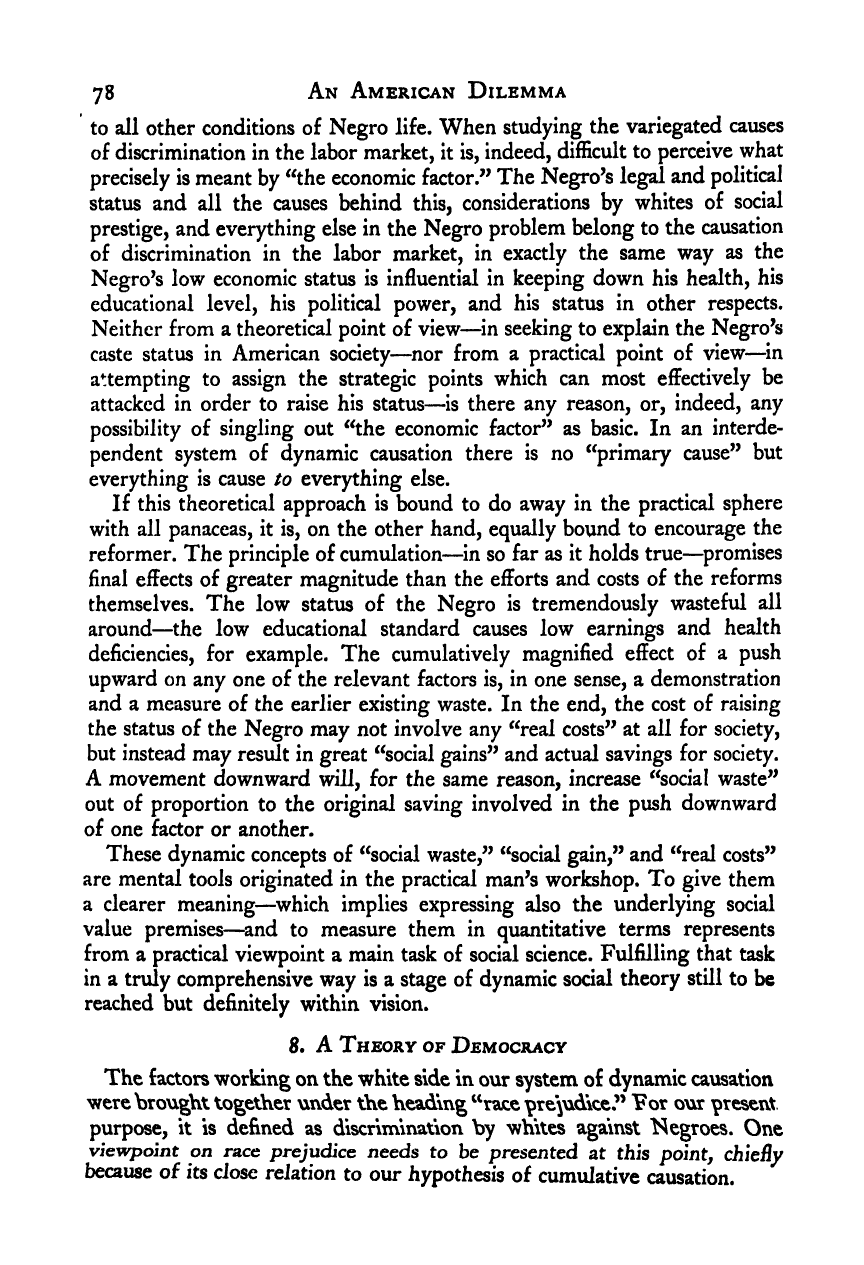Note: Gunnar Myrdal died in 1987, less than 70 years ago. Therefore, this work is protected by copyright, restricting your legal rights to reproduce it. However, you are welcome to view it on screen, as you do now. Read more about copyright.
Full resolution (TIFF) - On this page / på denna sida - I. The Approach - 3. Facets of the Negro Problem - 7. The Theory of the Vicious Circle - 8. A Theory of Democracy

<< prev. page << föreg. sida << >> nästa sida >> next page >>
Below is the raw OCR text
from the above scanned image.
Do you see an error? Proofread the page now!
Här nedan syns maskintolkade texten från faksimilbilden ovan.
Ser du något fel? Korrekturläs sidan nu!
This page has never been proofread. / Denna sida har aldrig korrekturlästs.
78 An American Dilemma
to all other conditions of Negro life. When studying the variegated causes
of discrimination in the labor market, it is, indeed, difficult to perceive what
precisely is meant by ^^the economic factor.’^ The Negroes legal and political
status and all the causes behind this, considerations by whites of social
prestige, and everything else In the Negro problem belong to the causation
of discrimination in the labor market, in exactly the same way as the
Negro’s low economic status is influential in keeping down his health, his
educational level, his political power, and his status in other respects.
Neither from a theoretical point of view—^in seeking to explain the Negro’s
caste status in American society—^nor from a practical point of view—^In
attempting to assign the strategic points which can most effectively be
attacked in order to raise his status—is there any reason, or, indeed, any
possibility of singling out ^^the economic factor” as basic. In an interde-
pendent system of dynamic causation there is no ‘^primary cause” but
everything is cause to everything else.
If this theoretical approach Is bound to do away in the practical sphere
with all panaceas, it is, on the other hand, equally bound to encourage the
reformer. The principle of cumulation—in so far as it holds true—promises
final effects of greater magnitude than the efforts and costs of the reforms
themselves. The low status of the Negro is tremendously wasteful all
around—the low educational standard causes low earnings and health
deficiencies, for example. The cumulatively magnified effect of a push
upward on any one of the relevant factors is, in one sense, a demonstration
and a measure of the earlier existing waste. In the end, the cost of raising
the status of the Negro may not involve any ‘‘real costs” at all for society,
but instead may result in great “social gains” and actual savings for society.
A movement downward will, for the same reason, increase “social waste”
out of proportion to the original saving involved in the push downward
of one factor or another.
These dynamic concepts of “social waste,” “social gain,” and “real costs”
are mental tools originated in the practical man’s workshop. To give them
a clearer meaning—which implies expressing also the underlying social
value premises—and to measure them in quantitative terms represents
from a practical viewpoint a main task of social science. Fulfilling that task
in a truly comprehensive way is a stage of dynamic social theory still to be
reached but definitely within vision.
8. A Theory of Democracy
The factors working on the white side in our system of dynamic causation
were brought together under the heading “race prejudice.” For our present
purpose, it is defined as discrimination by whites against Negroes. One
viewpoint on race prejudice needs to be presented at this point, chieSy
because of its close relation to our hypothesis of cumulative causation.
<< prev. page << föreg. sida << >> nästa sida >> next page >>